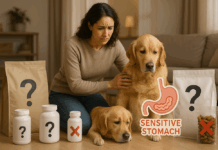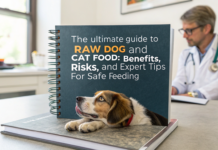Last Updated on July 23, 2022 by Dogs Vets
Just like we humans have food allergies to nuts, soy, and lactose, dogs can have food allergies too. Commercial dog food often contains many preservatives and chemicals in addition to cheap fillers that often trigger an allergic reaction.
Food allergies aren’t the same as food intolerances. Many people are quick to assume that any negative reaction to food is a food allergy. However, there is a big difference between a food allergy and food intolerance.
A food allergy occurs when the body’s immune system has an adverse reaction to a particular food protein. This can happen even in small amounts, and it can be potentially life-threatening.
In contrast, food intolerance occurs when the body has difficulty digesting a particular food. This can lead to symptoms like bloating and indigestion, but it is not usually dangerous.
For animal lovers, it’s important to be aware of these differences, as many animals suffer from food allergies. If you’re ever in doubt, it’s always best to err on the side of caution and consult with a veterinarian.
Symptoms of food allergies in dogs
Typical symptoms of a doggy food allergy include
- Itchy, dry, flaky skin
- Sneezing
- Patches of skin missing
- Excessive scratching
- Diarrhea
- Vomiting
- Rash and hot spots
- Fur dropping and excessive shedding
- Ear infections
Causes of Food Allergies
There are many possible triggers of an allergic reaction, and here are some common ones.
Beef
There is no doubt that beef is a popular ingredient in commercial dog food, but it is also one of the leading causes of food allergies in dogs.
Fortunately, this is an easy fix! If the symptoms persist, try switching to chicken or fish as a protein source. Besides lamb and rice, chicken and potatoes are also common combinations in commercial kibble.
Lamb
It was thought that lamb was an acceptable alternative to chicken or beef in dog diets that contained chicken or beef. However, lamb can still trigger an allergy.
In the event that your dog is allergic to lamb and rice, venison and sweet potato are good alternatives.
Chicken
Similarly to beef and lamb, these rules apply here as well! It is possible for your dog to be allergic to regular chicken.
Eggs
The proteins in the egg yolk cause your dog’s immune system to react abnormally, causing an egg allergy. The process of avoiding eggs is extremely simple. Just make sure you read food labels carefully.
Dairy
Certain dogs may experience digestive issues due to lactose intolerance, including flatulence, diarrhea, and vomiting. The problem is that a real dairy allergy can also cause the same symptoms, making it difficult to determine whether your dog is experiencing an intolerance or an allergy.
It is important to note that dairy allergies can cause skin itching or other symptoms, but lactose intolerance is always a digestive issue.
Wheat
There are many myths associated with carbohydrate-containing dog diets, especially grains. Compared to grain allergies, meat allergies are much more common in dogs. In contrast, wheat can cause allergic reactions in some dogs.
Each animal should be treated as an individual, so consult your veterinarian or pet nutritionist if you have questions about grains.
How To Treat Food Allergies In Dogs
Food allergies won’t go away and can surface at any time in your dog’s life. If you suspect a food allergy, go to your veterinarian who might put your dog on a prescription diet, or try an elimination diet to see which ingredient is the one that is causing a reaction.
As soon as you identify the foods causing your dog’s problems, you should eliminate them from his diet as much as possible.
Additionally, you might want to add vitamins and natural supplements to compensate for any nutrients that may be lacking.
Conclusion
We hope you enjoyed this article… What are your thoughts?
Please feel free to share this article!























